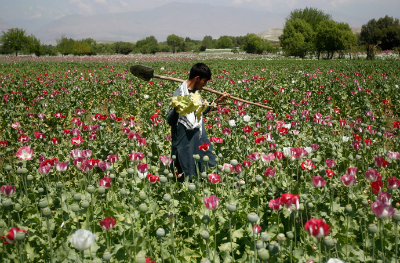Opium poppy cultivation in Afghanistan has hit an all-time high despite years of counter-narcotics efforts that have cost the US $7.6bn (£4.7bn), according to a US government watchdog.
The UN Office on Drugs and Crime reported that Afghan farmers grew an “unprecedented” 209,000 hectares (523,000 acres) of opium poppy in 2013, surpassing the previous high of 193,000 hectares in 2007, said John Sopko, the special inspector general for Afghanistan reconstruction.

An Afghan man works on a poppy field in Jalalabad province. (Photo: Parwiz/Reuters)
“In past years, surges in opium poppy cultivation have been met by a coordinated response from the US government and coalition partners, which has led to a temporary decline in levels of opium production,” Sopko said in a letter to the secretary of state, John Kerry, the defence secretary, Chuck Hagel, and other top US officials.
“The recent record-high level of poppy cultivation calls into question the long-term effectiveness and sustainability of those prior efforts,” he said on Tuesday.
Afghanistan produces more than 80% of the world’s illicit opium, and profits from the illegal trade help fund the Taliban insurgency. US government officials blame poppy production for fuelling corruption and instability, undermining good government and subverting the legal economy.
The US has spent $7.6bn on counter-narcotics efforts in Afghanistan since the start of the 2001 war, it said.
Sopko said the UN drug office estimated the value of poppy cultivation and opium products produced in Afghanistan in 2013 at about $3bn, up on the $2bn estimated in 2012.
“With deteriorating security in many parts of Afghanistan and low levels of eradication of poppy fields, further increases in cultivation are likely in 2014,” Sopko said.
He said affordable deep-well technology brought to Afghanistan over the past decade had enabled Afghans to turn 200,000 hectares of desert in the south-west of the country into arable land, much of it devoted to poppy production.
The UN Office on Drugs and Crime reported that Afghan farmers grew an “unprecedented” 209,000 hectares (523,000 acres) of opium poppy in 2013, surpassing the previous high of 193,000 hectares in 2007, said John Sopko, the special inspector general for Afghanistan reconstruction.
In a letter responding to the findings, the US embassy in Kabul said the rise in poppy cultivation and decline in eradication efforts by provincial authorities was “disappointing news”. It said American officials were helping Afghans develop the ability to lead and manage a long-term counter-narcotics effort.
The embassy said the fight against poppy cultivation had had an impact on growers, resulting in a change in where the crop is planted.
“Essentially, poppy cultivation has shifted from areas where government presence is broadly supported and security has improved, toward more remote and isolated areas where governance is weak and security is inadequate,” it said.
Michael Lumpkin, the assistant secretary of defence for special operations and low-intensity conflict, said in a letter in response that the Pentagon had supported counter-narcotics operations by other US government agencies but was not responsible for managing poppy eradication programmes.
“In our opinion, the failure to reduce poppy cultivation and increase eradication is due to the lack of Afghan government support for the effort,” he said.



